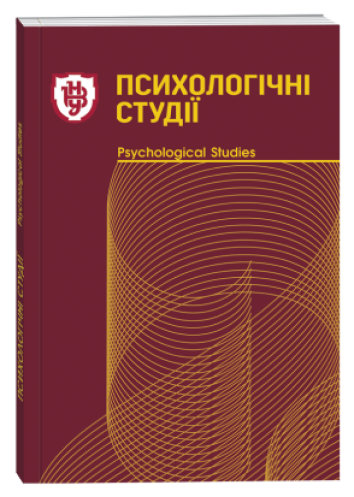NEUROPARENTING IN THE CONTEXT OF EDUCATION OF CHILDREN WITH AUTISM SPECTRUM DISORDER
DOI:
https://doi.org/10.32782/psych.studies/2024.1.18Keywords:
neurocentric model of education, neuroparenting, responsibility, autism spectrum disorder, neurodifferenceAbstract
Raising a child with an autism spectrum disorder in one way or another is related to parents receiving information about the peculiarities of the child's neurological status in connection with his diagnosis, the specifics of development and effective methods aimed at successfully adapting him to life in society. Focusing on this kind of information, parents develop a unique style of interaction and communication with the child, which can be characterized as neuroparenting. The article analyzes critical publications regarding the neurocentric model of education and its implementation in social practice. The main provisions of the model are considered from the point of view of their functional significance in parents' understanding of the characteristics of the behavior of a child with autism spectrum disorders, acceptance of the diagnosis, finding adequate ways of interaction and communication with her. Attention is drawn to the fact that neuroparenting as a certain role model largely deprives parents of naturalness and spontaneity in their relationship with children, creates a sense of guilt for treating them as experts, and not as loving parents. It is shown that certain provisions of the neurocentric model of education not only do not correspond to modern scientific ideas about brain development, but also generate negative emotional experiences in parents who are guided by them. In particular, this is the provision that the first three years of a child's life are critical for the development of the psyche; timely provision of a developing environment and a large number of therapeutic interventions guarantee a "normal" child in the end; parents bear the primary responsibility for raising such a child. It is indicated that the non-acceptance of the fact of neurodifferences in the development of a child with autism spectrum disorders and the increased responsibility of parents for timely provision of therapy and upbringing of a child capable of adapting to the standards of the majority can become an additional source of parental stress.
References
Bartušienė D. Autizmas ir neurotėvystė/motinystė: kai vien meilės nepakanka. Kultūra ir visuomenė: socialinių tyrimų žurnalas. 2021. № 12. P. 55–87. https://doi 10.7220/2335-8777.12.3.
Elder J. H., Kreider C. M., Brasher S. N., Ansell M. Clinical impact of early diagnosis of autism on the prognosis and parent–child relationships. Psychology Research and Behavior Management. 2017. № 10. P. 283–292. https://doi.org/10.2147/PRBM.S117499.
Hodge N. S. Disabling families: How parents experience the process of diagnosing autism spectrum disorders. Sheffield Hallam University (United Kingdom). 2006. URL: https://shura.shu.ac.uk/17143/1/Hodge_30651.pdf.
Jacobs D., Hens K. Love, Neuro-Parentingand Autism: From Individual to Collective Responsibility towards Parents and Children. Analize. Journal of Gender and Feminists Studies. 2018. № 10. P. 102–124. URL: https://www.analizejournal.ro/wpcontent/uploads/issues/numarul_11/11_5_jacobs_hens-102-124.pdf.
Jacobs D., Steyaert J., Dierickx K. and Hens K. Implications of an Autism Spectrum Disorder Diagnosis: An Interview Study of How Physicians Experience the Diagnosis in a Young Child. Journal of Clinical Medicine. 2018. № 7 (10): 348 p. https://doi.org/doi: 10.3390/jcm7100348.
Kaczmarek E. Radzenie sobie z rolą matki dziecka z autyzmem w narracji autobiograficznej. Niepełnosprawność – zagadnienia, problemy, rozwiązania. 2016. Vol.I. № 18. P. 42–59. URL: http://kn.pfron.org.pl.
Macvarish J. Neuroparenting: The Expert Invasion of Family Life. Palgrave Macmillian. UK. 2016. 125 с. URL: https://www.researchgate.net/publication/306428868_Neuroparenting_The_Expert_Invasion_of_Family_Life.
McCafferty P., & McCutcheon J. Parenting a Child with Autism: Considering the Stresses, Supports and Implications for Social Work Practice. Child Care in Practice. 2020. Vol. 1 № 17. P. 389–405. https://doi.org/10.1080/13575279.2020.1765145.
Picardi A., Gigantesco A., Tarolla E., Stoppioni V., Cerbo R., Cremonte M., Alessandri G., Lega I., & Nardocci F. Parental Burden and its Correlates in Families of Children with Autism Spectrum Disorder: A multicentre study with two comparison groups. Clinical Practice and Epidemiology in Mental Health. 2018. № 14. P. 143–176. https://doi.org/10.2174/1745017901814010143
Pozo P., Sarriá E. Prediction of Stress in Mothers of Children with Autism Spectrum Disorders. The Spanish Journal of Psychology. 2014. Vol. 17. URL: https://doi.org/10.1017/sjp.2014.6.
Snoek A., Horstkötter D. Neuroparenting: the Myths and the Benefits. An Ethical Systematic Review. Neuroethics. 2021. P. 387–408. https://doi.org/10.1007/s12152-021-09474-8
Voinsky I., Fridland O. Y., Aran A., Frye R. E., Gurwitz D. Machine learning-based blood RNA signature for diagnosis of autism spectrum disorder. International Journal of Molecular Sciences, 2023. № 24(3), 2082. https://doi.org/10.3390/ijms24032082
Waltz M. The production of the “normal” child: Neurodiversity and the commodification of parenting. In H. Bertilsdotter Rosqvist, N. Chown, & A. Stenning (Eds.), Neurodiversity Studies: A New Critical Paradigm (Routledge Advances in Sociology). Routledge. 2020. https://doi.org/10.4324/9780429322297-3







